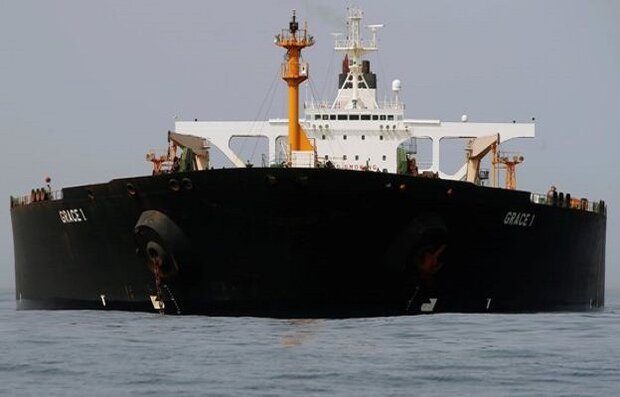The captain said marines made his unarmed crew kneel on the deck at gunpoint.
The MoD said the seizure complied with "international rules and norms".
Earlier this month, UK forces helped authorities in Gibraltar who believed Grace 1 was carrying oil to a Syrian refinery in breach of EU sanctions.
On 4 July, about 30 marines from 42 Commando were flown from the UK to Gibraltar to help detain the tanker and its cargo, at the request of the Gibraltar government.
The vessel's captain, an Indian national who asked not to be named, said he was radioed a police request to board his ship and lowered his ladder.
But before anyone could board, a military helicopter landed on the ship in a "very dangerous" move, he said.
He told the BBC he identified himself as the captain but the marines ignored him and instead pointed their guns and shouted "look forward, look forward".
He said: "They didn't care whether I was master… there was no regulations… we had 28 unarmed crew. I was in a state of shock, everybody was in a state of shock.
"How do you come on a ship like this with armed forces and such brute force. For what reason?"
He said the marines could have boarded the ship and simply told him he had been arrested.
The captain agreed to speak to the BBC on condition his name was not used, saying he and his crew had been advised by Indian High Commission officials to remain anonymous.
Asked whether he felt there was anything illegitimate about his ship or the cargo, he said he had "followed company procedures", adding he did not know about the EU sanctions against Syria.
The MoD said the operation on Grace 1 was a "standard boarding" and that British armed forces were "held to the highest standards of professionalism".
Royal Gibraltar Police said the marines had acted in support of its officers and applied "the minimum use of force" to ensure officers could get on board, deal with the crew and take control of the vessel.
It added that the ship's four senior officers had been interviewed under caution.
The Gibraltar government said it had evidence which contradicted statements made by the captain would release its own statement soon.
It said it had reason to believe the ship was carrying Iranian crude oil to the Baniyas Refinery in Syria, which the EU says provides financial support to the Syrian government. The refinery has been subject to EU sanctions since 2014.
Relations between Iran and the UK soured after an Iran-operated oil tanker, Grace 1, was illegally detained by British Royal Marines in Gibraltar on July 4, on accusations that the tanker was carrying oil to Syria in possible violation of the European Union’s sanctions on the Arab country. Iran condemned the move as “piracy” and called for the immediate release of the tanker.
Iran condemned the move as “piracy” and summoned Britain’s ambassador in protest over it, highlighting that neither the tanker was headed to Syria, nor Iran is a member an EU member and subject to any European oil embargo.
"Unlike the piracy in the Strait of Gibraltar, our action in the Persian Gulf is to uphold international maritime rules," wrote Iranian Foreign Minister Zarif in a tweet.
A few days later, Iran seized a UK-flagged oil tanker 'Stena Impero' for “failing to respect international maritime rules.”
“Detaining of Iranian oil tanker, Grace 1, by UK in Gibraltar was a violation of JCPOA since none of the deal’s members can impede Iran from exporting its oil,” Iran’s Deputy Foreign Minister Abbas Araghchi said before today’s extraordinary meeting of the Joint Commission of the Joint Comprehensive Plan of Action (JCPOA) in Vienna on July 28.
MNA/PR

























Your Comment